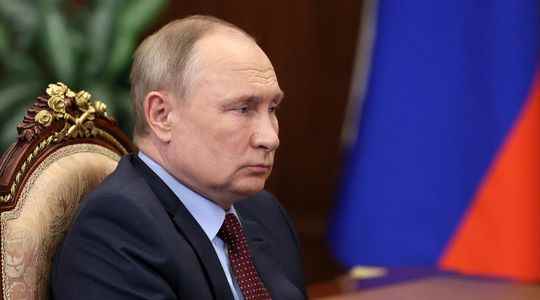President Vladimir Putin is misled by his advisers who are “afraid to tell him the truth” about his “flawed” war strategy in Ukraine where Russian troops sabotage equipment and accidentally shoot down their own plane, British intelligence and Americans. Close allies, whose spies work to highlight Russia’s failures and Kremlin divisions, say the Kremlin master’s advisers are ‘too scared’ to tell him the full truth about Moscow’s setbacks on the battlefield and the real impact of sanctions.
A few hours after the publication by the White House of its intelligence report on the situation in Ukraine, the head of the British intelligence agency GCHQ, Jeremy Fleming, estimated Thursday March 31 in a speech at the Australian National University of Canberra that the Russian leader had overestimated his army’s ability to achieve a quick victory. “We have seen Russian soldiers – out of arms and in low morale – refusing to carry out orders, sabotaging their own equipment and even accidentally shooting down their own aircraft,” he said. “And even if Putin’s advisers are afraid to tell him the truth, what is happening and the extent of these miscalculations must be perfectly clear to the regime,” he said.
According to Jeremy Fleming, the Russian president underestimated Ukrainian resistance, the strength of the international coalition against him and the impact of economic sanctions. It is “pretty obvious” that Putin is badly advised, agrees Marcus Hellyer, defense analyst at the Australian Strategic Policy Institute in Canberra. According to him, Western intelligence is trying to sow dissent or fuel doubt about Vladimir Putin’s judgment in Russia. Whatever advice he receives, Vladimir Putin has resources and is unlikely to agree to a deal unless he has something “very substantial” to present to the Russian people, he added. . “They may have realized that they cannot completely defeat Ukraine, so they will adopt a different strategy, which is to occupy all of Donbass, to occupy the Black Sea coast as much as possible and to use this (…) for their trading strategy.”
“Deceived”
“It is a well-known phenomenon, and very present in authoritarian regimes where one cannot contest the authority of the chief, and where one limits oneself to affirming what pleases his superior. what we could call a confirmation bias”, summarizes the Swiss daily The weather Jean-Marc Rickli of the Center for Security Policy in Geneva.
The remarks echo a White House briefing on US intelligence released Wednesday. According to their information, Putin’s relations with his military personnel have deteriorated. “We have information, which we have now made public, that (Vladimir Putin) felt cheated by the Russian military,” White House communications director Kate Bedingfield said. In recent days, Ukrainian forces have retaken territory, including Irpin, located on the strategic outskirts of kyiv, as the Russian offensive appears to have stalled, five weeks after the start of the invasion on February 24.
The US and UK intelligence reports come as questions mount over the Russian president’s relationship with his defense minister, Sergei Shoigu, who disappeared from public view for weeks before reappearing on March 26. in a TV show. Undated footage showed Sergei Shoigu – who there referred to a finance ministry meeting the day before – chairing a meeting on Russia’s defense procurement. There is “persistent tension” between Vladimir Putin and Moscow’s Defense Ministry, a consequence of the Russian leader’s distrust of his leadership, a senior US official in Washington has said.
Wagner Group
According to the Russian news site Meduza, based in Latvia, Russian intelligence experts said that the head of the FSB’s “fifth service”, Sergei Beseda, and his deputy, Anatoly Bolukh, had both been placed under house arrest in the framework of an investigation. FSB Dosye, an investigative site specializing in the work of the FSB, said reports of a large-scale purge within the institution were exaggerated.
Sergei Beseda was actually questioned by investigators, but is still in office and is not under arrest, according to the site. Anatoly Bolukh was also questioned but has not been number two in the fifth service for a few years, adds FSB Dosye. Cyberattacks from Russia remain a threat for the time being, Fleming further warned: “We have seen indicators that suggest Russian cyberactors are seeking targets in countries that oppose their actions.”
On the ground in Ukraine, Moscow uses mercenaries and foreign fighters to support its own forces. Among them is the Wagner Group, which is “shifting into high gear” after having been active in the country since Russia’s annexation of Crimea in 2014. “The group works like a shadow branch of the Russian military”, allowing Vladimir Putin to relieve himself of responsibility for “riskier operations”, he argued.
